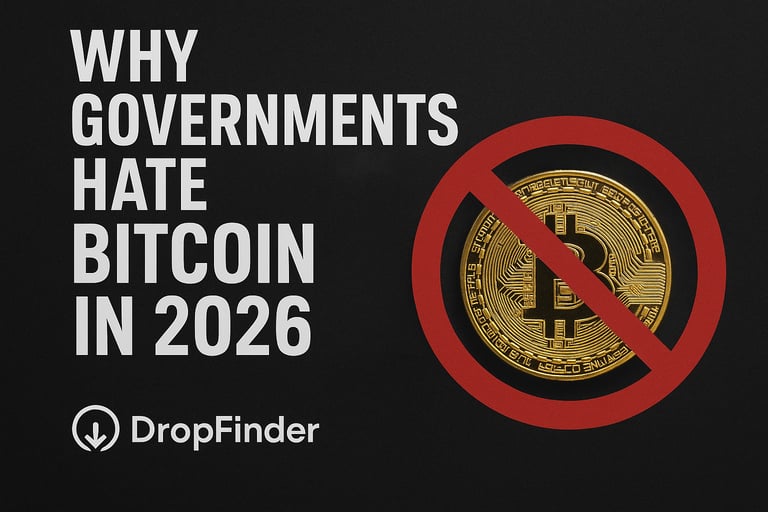Why Governments Hate Bitcoin in 2026 – Complete Insight with DropFinder
Discover why governments are resisting Bitcoin in 2026. Explore regulatory, economic, and political reasons, and learn how platforms like DropFinder help investors navigate the crypto world safely.
LATEST AIRDROPCRYPTO NEWS
9/26/20254 min read
Why Governments Hate Bitcoin: Understanding the Global Pushback (2026)
Bitcoin, the world’s first decentralized cryptocurrency, has revolutionized how people view money, ownership, and financial freedom. Over the past decade, BTC has grown from an obscure experiment into a trillion-dollar ecosystem. Yet, despite its immense popularity, governments around the globe often view Bitcoin with skepticism, if not outright hostility.
In this comprehensive guide, we explore the reasons why governments dislike Bitcoin, its economic and political implications, and how platforms like DropFinder are shaping the way investors find and track crypto opportunities in a rapidly changing market.
1. Bitcoin Challenges Traditional Financial Systems
The most fundamental reason governments dislike Bitcoin is that it circumvents centralized control. Traditional financial systems—central banks, fiat currencies, and regulatory frameworks—depend on centralized oversight to control money supply, influence inflation, and implement economic policies.
Bitcoin, by design, is decentralized. Transactions are peer-to-peer, verified by a distributed network of miners and nodes rather than a central authority. This decentralization means:
Governments cannot print or destroy BTC.
Central banks cannot adjust BTC supply to manage economic growth.
Traditional regulatory oversight is limited.
For governments accustomed to controlling national economies, Bitcoin represents a potential loss of power. Countries like India, China, and Turkey have repeatedly warned citizens about investing in BTC, citing risks to financial stability and national security.
2. Fear of Tax Evasion and Financial Crime
Another reason governments are wary of Bitcoin is its pseudo-anonymous nature. While every BTC transaction is recorded on the blockchain, the identity of the transacting parties is not always transparent. This raises concerns about:
Tax evasion: Users can potentially avoid reporting income or capital gains.
Money laundering: BTC can be used to move illicit funds across borders without detection.
Terrorist financing: Some governments worry about BTC being used to fund illegal activities.
Although many regulatory frameworks now attempt to enforce KYC (Know Your Customer) and AML (Anti-Money Laundering) compliance for crypto exchanges, the decentralized nature of BTC makes it difficult to regulate entirely. This fuels government distrust.
3. Threat to National Currency Stability
Bitcoin’s rise also poses a threat to national currencies. Countries with weak or unstable fiat systems are particularly concerned:
If citizens convert large amounts of local currency to BTC, it reduces demand for national currency.
This can destabilize the local economy and make monetary policy less effective.
Governments may respond by restricting crypto exchanges or banning BTC outright.
For example, countries like Nigeria and India have imposed strict rules on crypto trading to prevent capital flight and protect the stability of their national currencies.
4. Regulatory and Legal Challenges
Governments also dislike BTC because it complicates existing regulatory frameworks. Traditional financial regulations are built around centralized intermediaries, like banks and payment processors. Bitcoin, being decentralized, challenges these norms.
Who is responsible if something goes wrong?
How do regulators enforce anti-fraud measures?
Can a decentralized network comply with securities laws?
These questions have made governments cautious, leading to strict licensing requirements for crypto exchanges, outright bans in some jurisdictions, and heavy taxation in others.
5. Environmental Concerns
Bitcoin mining requires massive amounts of energy, primarily from electricity-intensive proof-of-work systems. Governments, particularly those trying to meet climate targets, are concerned about:
Carbon emissions from mining farms.
Strain on local energy grids.
The environmental cost of unregulated mining operations.
This has prompted countries like China (before its BTC ban) and others to restrict mining or shift toward cleaner energy policies. Environmental concerns are often used as a public justification for restrictions, even though they are intertwined with economic control motives.
6. Political Concerns
Bitcoin also undermines government power in more subtle ways:
Decentralized money removes the need for intermediaries, which reduces the influence of financial institutions aligned with government agendas.
It empowers citizens to transact without government surveillance.
In authoritarian regimes, this threatens their ability to monitor and control economic activity.
Because of this, BTC is sometimes framed as a tool of financial rebellion, making governments wary of mass adoption.
7. Economic Volatility
Bitcoin’s price volatility is another reason governments are concerned. Large swings in BTC value can:
Create speculative bubbles that harm retail investors.
Encourage risky financial behavior that undermines consumer confidence.
Pose systemic risks if BTC were widely adopted in the traditional economy.
Governments prefer stable fiat currencies because they allow predictable economic planning and taxation. BTC’s wild fluctuations make it difficult for regulators to embrace it fully.
8. International Competition
Another overlooked factor is geopolitical economics. Bitcoin is borderless. Citizens of one country can hold BTC without oversight, potentially weakening the financial influence of national banks.
Governments are concerned about capital flight to countries with lighter regulations.
Some see BTC as a competitor to national digital currency initiatives, such as central bank digital currencies (CBDCs).
Countries that embrace BTC too quickly may unintentionally give their citizens a financial tool outside government control.
9. How Investors Navigate BTC Despite Government Pushback
Despite government resistance, Bitcoin adoption continues to grow. Tools like DropFinder help investors discover emerging crypto projects, airdrops, and investment opportunities in a rapidly evolving landscape. By staying informed and leveraging platforms like DropFinder, users can track legitimate BTC opportunities and navigate the risks associated with regulatory restrictions.
DropFinder’s features, such as real-time updates, detailed project insights, and verification systems, provide investors a safe and reliable gateway into the crypto ecosystem, even in regions with restrictive policies.
10. The Future of Bitcoin and Government Relations
Looking ahead, the relationship between BTC and governments is likely to remain complex and evolving:
Governments may gradually integrate BTC through regulated exchanges and CBDCs.
Crypto adoption will continue among private citizens seeking financial freedom.
Platforms like DropFinder will play a key role in educating users and offering tools for safer engagement.
While governments may continue to resist BTC, the underlying principles of decentralization, financial sovereignty, and technological innovation make it unlikely that Bitcoin will be entirely suppressed.
Conclusion
Governments dislike Bitcoin for multiple reasons: decentralization, threat to national currencies, regulatory challenges, tax evasion concerns, environmental issues, and political control. Despite these hurdles, BTC continues to thrive, driven by a global community seeking financial autonomy.
Platforms like DropFinder make it easier for investors to stay ahead, find trustworthy crypto projects, and safely navigate the evolving digital financial landscape.
In a world where financial systems are increasingly digital, understanding why governments resist Bitcoin—and how to responsibly participate in the ecosystem—is more important than ever.
Bitcoin is more than a currency; it’s a movement challenging traditional power structures, and governments’ opposition only highlights its disruptive potential.




